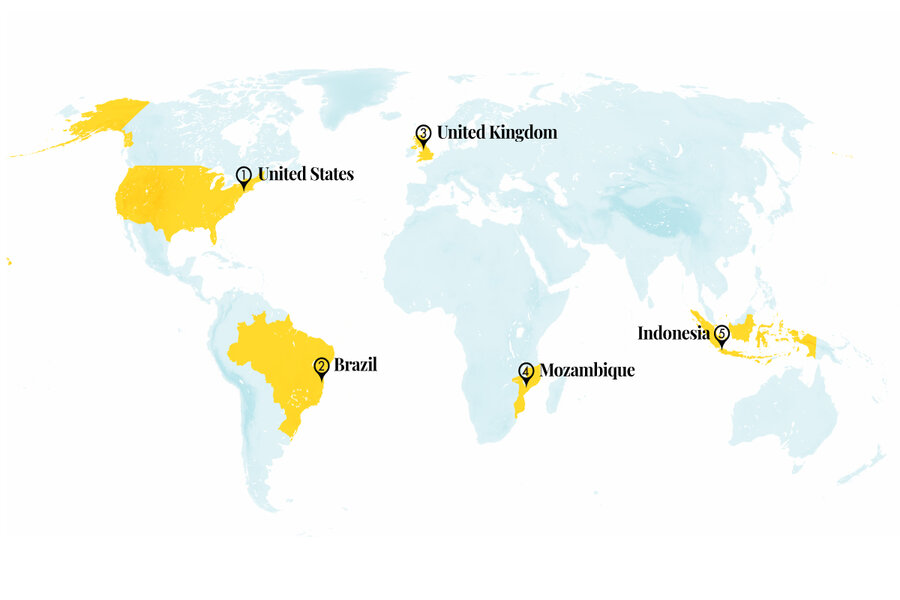Reunited: Stolen art goes home, and why lonely habitats need company
Loading...
1. United States
The Manhattan District Attorney’s Office in New York has secured the return of more than 950 stolen antiquities in the past year. More than $160 million worth of art and artifacts have been returned to 17 countries, from Cambodia and Pakistan to Greece and Italy.
At a March repatriation ceremony for 12 Turkish antiquities, the artifacts included a bronze of a Roman emperor that was looted from an archaeological site in the 1960s, smuggled to Europe, loaned to the Museum of Fine Arts in Boston, and in 2011 landed at the Metropolitan Museum of Art.
Why We Wrote This
A story focused onIn our progress roundup, there’s a dedication to repairing the divisions that people have caused – in nature and in the world of art.
The returns come as institutions are reckoning with items in their collections that were stolen – or at least acquired in a dubious manner. Native American ancestral remains are a special category covered by their own U.S. law, and some museums and universities have pledged to return these remains only to be slow to follow through.
But returns are making a difference: In Italy, where illegally excavated artifacts belong to the state, the Museum of Rescued Art opened in Rome last summer. “Up until 10 years ago, it was considered oh so gauche to ask inconvenient questions of provenance – it just wasn’t done,” said Matthew Bogdanos, who founded the antiquities traffic unit, in a TV interview. “That was then. ... This is now.”
Sources: CBS News, Manhattan District Attorney’s Office, ProPublica
2. Brazil
A nonprofit is working to reconnect “islands” of Brazil’s original Atlantic Forest. Much of this coastal rainforest southeast of the Amazon has been fragmented by farms, ranches, and people, leaving patches of forest isolated from one another. It’s a threat to biodiversity, as species struggle to survive with shrinking gene pools and less land.
By purchasing and rewilding stretches of ranchland and farmland that separate small forest areas, the group Saving Nature is creating corridors to strengthen resiliency of vulnerable flora and fauna. More biodiversity in larger ecosystems can also store more carbon than can plantation forests or degraded farmland.
After buying enough cattle pasture for a 250-acre corridor to connect to the 6,200-acre União Biological Reserve, Saving Nature handed over the property to reserve officials, who obtained a conservation easement. Now, the total area of protected space contains 49,400 acres of contiguous forest.
“We found the [wild] species came back, moving through the corridors an awful lot faster than we [expected],” said conservation scientist Stuart Pimm, founder of the nonprofit. “I thought this was something I would have to live to be 100 to see, but the reality is it’s the tropics: It’s warm and wet and the trees grow fast.”
Source: Mongabay
3. United Kingdom
Women are making strides in British business leadership. More than 150,000 companies were launched by women in the United Kingdom last year, setting a record. This figure represents a fifth of all businesses started in the U.K. in 2022, and more than twice the number started by women in 2018. The number of female entrepreneurs 25 years old and under increased by a factor of 22 in that period.
“We need to have more visibility and more role models,” said businesswoman Sahar Hashemi. “If you can see someone else doing it, you’re much more likely to give it a try yourself.”
Men remain three times more likely to start a business – a gender gap that amounts to £250 billion ($309 billion) in potential value that could be added to the British economy, according to the Rose Review of Female Entrepreneurship.
Separately, among the U.K.’s 350 biggest publicly listed firms, women hold 40% of board seats – up from 9.5% in 2011. The FTSE Women Leaders Review, a voluntary industry framework for the push for gender equality, stresses that diverse workplaces increase business performance as well as provide opportunity for women. Another goal of the FTSE Review is getting more women in company leadership roles.
Sources: Positive News, Reuters, FTSE Women Leaders Review, NatWest Group
4. Mozambique
Warning systems saved lives during Tropical Cyclone Freddy, the most energetic and longest cyclone ever recorded. Radio and TV announcements, cars with loudspeakers, and text messages were all deployed in Mozambique to warn residents and tell them where to seek shelter ahead of the storm.
Evaluating the improvements, officials considered the number of lives lost after Cyclone Idai hit the country in 2019, and the damage wrought by Freddy when it hit neighboring Malawi, where warnings and preparations are less developed.
“It is a very structured [warning] system ... down to village level,” said Myrta Kaulard, United Nations resident coordinator for Mozambique.
“Local authorities came around my neighborhood to alert us of the imminent danger. They blew the whistle,” said Quelimane resident Amelia Antonio. “What remains of my house is just sticks standing. If I’d been there, I don’t know what would have happened.”
The United Nations and the World Meteorological Organization consider early warning systems and early action to be critical adaptations as storms become more powerful due to climate change.
Sources: Reuters, United Nations, World Meteorological Association
5. Indonesia
Residents of an informal settlement saw their homes razed, but they fought to return and helped design the permanent buildings that replaced the slum. The Kampung Akuarium eviction in 2016 displaced 241 families who had lived there for decades. After a gubernatorial election made negotiations more feasible, residents worked with authorities to create Jakarta’s first self-managed municipal housing.
The residents’ design input replicated the tight-knit community and micro-economy that defined the slum. Each apartment has a nook at the resident’s door where they can sell goods. Broken appliances are fixed by a resident technician, and a carpenter makes and sells furniture. The buildings have community gardens, and open stairwells facilitate cross-floor conversations. The first two buildings were opened in August 2021, with the remaining three set to open this year.
“Professional experts aren’t the sole authority when it comes to finding the best solution to the community’s needs,” says Amalia Nur Indah Sari, an architect on the project who works for the Rujak Center for Urban Studies. “In fact, they aren’t even the most important. The residents know what is best for them.”
Source: Reasons to be Cheerful









